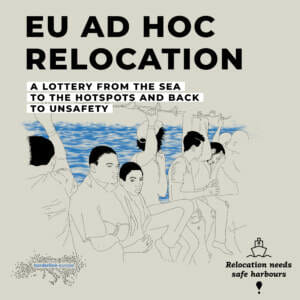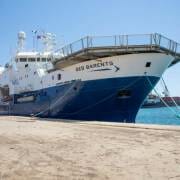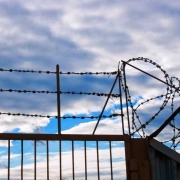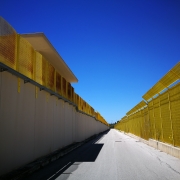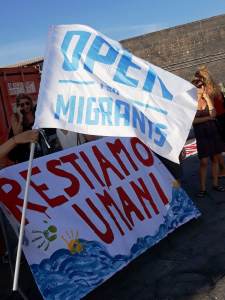Discriminatory practices in ad hoc relocation procedures
Article first published on March 18, 2021
Over the last two years, Borderline Sicilia in collaboration with Borderline-Europe, Equal Rights, Refugee Council Germany and Sea-Watch, has analysed the relocation procedures that arose in the summer of 2018, when former Interior Minister Matteo Salvini declared Italian ports closed to ships carrying out rescues in the Mediterranean.
These procedures were confirmed by the subsequent government with the so-called Malta Agreements, signed by Malta, Italy, France and Germany.
The agreement provided for the fast and timely transfer of asylum seekers from the countries of first entry – Italy and Malta – to other member states that were willing to relocate a share of the people rescued in the Mediterranean. The report meticulously reconstructed the journey of these people from their arrival in Italy or Malta to their relocation to Germany and other European countries. Through the direct testimonies of the people subjected to the relocation procedures, we were able to show how these procedures were applied in an arbitrary and non-transparent manner by the European Agency EASO and the delegations of the countries that had agreed to relocate some of the asylum seekers identified in the Italian and Maltese hotspots.
The report, first of all, highlights the aberrant and inhuman conditions in the Maltese and Italian hotspots, and the absolute lack of basic services in the reception centers set up by the Italian authorities to host asylum seekers during the relocation procedure. In Malta, the situation of asylum seekers is worsened by the permanent state of detention in the hotspots, which also lack basic services.
The report denounces the lack of transparency in the relocation procedure, which is arbitrary and subject to discretion. Asylum seekers are interviewed three times: first by Frontex, then by EASO and finally by the delegation of the country that has agreed to relocate them. From the testimonies collected, it could be seen that asylum seekers are asked the same questions three times, without any understanding of the reason for this repetition and without any kind of explanation from EASO staff.
Moreover, these are questions that – as we learned from the testimonies – raise doubts about the good faith of the relocations, showing clear signs of ethnic-religious discrimination. Many people of Muslim faith were asked whether they would impose the hijab on their partners once they were relocated, or whether they would denounce a relative or friend if he or she was about to commit a terrorist attack. Questions that had nothing to do with why they were being asked. After the various interviews, the asylum seekers were not provided with any documents containing a transcript of the content of the interviews. Many were denied at one of the three stages of the procedure without being given a reason and informed about the continuation of the process.
The research revealed that the time taken to define procedures is very long. Despite the fact that the Maltese agreements specify that the time limit for relocation is set at four weeks, we collected testimonies of people who remained in Italy for up to a year and a half before the final relocation.
Once relocated to Germany, most asylum seekers face an accelerated asylum procedure, without access to legal information and judicial remedies, and are eventually threatened with deportation. Approximately 90 percent of the persons transferred to Germany received a negative decision regarding the possibility of obtaining international protection and many have already received a deportation order.
“We feel trapped and deceived and have the feeling that we have been brought to Germany only to be deported to unsafe places. We are not objects, but human beings who should be treated as human beings and not as objects of an unequal system where some are worth more than others,” says Musa Khalifa from Nigeria, who has been transferred to Germany and is now threatened with expulsion.
What is worrying is that the ad hoc relocation mechanism is being used as a model for the new 2020 migration pact, enshrining a so-called solidarity mechanism whereby asylum seekers are relocated or assisted in their repatriation. There is therefore a real possibility that returns will be delegated to member states with return agreements with certain non-European countries, thus avoiding a screening of the person’s history. At the moment, the content of the pact is still a proposal and – due to the criticalities detected by this report – it can and must be modified.
In summary, the research conducted has highlighted the following critical issues:
- Protection seekers do not have adequate access to legal assistance or information about the procedure while detained in hotspots for months or years;
- The relocation procedure undermines the well-being of applicants for protection and the selection mechanism shows clear discriminatory practices;
- The procedure takes too long before applicants for protection are relocated;
- Not all applicants for protection were actually relocated: a part remained stuck in Italy and Malta;
- Most of those who were relocated to Germany had their applications rejected following an accelerated procedure and are now threatened with deportation.
Therefore we demand:
Full transparency of the whole relocation and asylum procedure for people subject to these measures.
No discrimination against people seeking protection in Europe.
No detention in border states.
Safe passage to and from the European Union.
Protection and guaranteed access to the right to protection.
The full report with video material and background information is available at: https://eu-relocation-watch.info/
The project was funded by Stiftungsfonds zivile Seenotrettung
Giuseppe Platania
Borderline Sicilia
Translation by Sandra Krause

